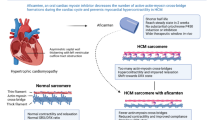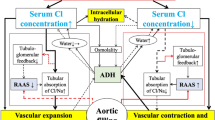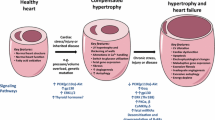Abstract
We have shown that chronic treatment with carteolol, a non-selective β-adrenergic receptor antagonist, improved left ventricular (LV) function and survival in an avian model of dilated cardiomyopathy (DCM). The aim of the present study was to compare ex vivo heart function with and without β-agonist and antagonist challenge. We investigated whether intracoronary infusion of a β-blocker, carteolol or β-agonist, isoproterenol decreased contractility. In the DCM group, isoproterenol resulted in a significantly greater increase in heart rate (71% vs. 28% compared to control hearts). To investigate the mechanism for the increase in heart rate, we exposed spontaneously beating neonatal cardiomyocytes to serum immunoglobulin (IgG) isolated from DCM animals. Serum IgG resulted in a significant increase in spontaneous beating rate in neonatal rat cardiomyocytes that was blocked by pre-treatment with a β-blocker. Carteolol challenge did not significantly change heart rate but did significantly increase LV peak pressure in DCM hearts (62%) while coronary artery flow remained unchanged (2.7 ± 0.1 vs 2.7 ± 0.5 ml/min/g). These results show that 1) β-receptor stimulation results in a greater tachycardic response in DCM animals, and 2) carteolo challenge improves myocardial contractility in hearts from DCM animals independent of heart rate or changes in coronary artery flow.
Similar content being viewed by others
References
Waagstein F, Hjalmarson A, Vamauskas E, Wallentin I. Effect of long-term β-adrenergic receptor blockade in congestive cardiomyopathy. British Heart J 1975; 37: 1022-1036.
Bristow MR, Ginsburg Umans V, Fowler M, et al. β1-and β2-adrenergic-receptor subpopulations in nonfailing and failing human ventricular myocardium: Coupling of both receptor subtypes to muscle contraction and selective β1-receptor down-regulation in heart failure. Circ Res 1986; 59: 297-309.
Gwathmey JK, Slawsky MT, Hajjar RJ, Briggs GM, Morgan JP. Role of intracellular calcium handling in force-interval relationships of human ventricular myocardium. J Clin Invest 1990; 85: 1599-1613.
Hasenfuss G, Holubarsch C, Hermann, Astheimer K, Pieske B, Just H. Influence of the force-frequency relationship on hemodynamics and left ventricular function in patients with nonfailing hearts and in patients with dilated cardiomyopathy. Eur Heart J 1994; 15: 164-170.
Mulieri LA, Hasenfuss G, Leavitt B, Allen PD, Alpert NR. Altered myocardial force-frequency relation in human heart failure. Circulation 1992; 86(6): 2017-2018.
Mulieri LA, Leavitt BJ, Martin BJ, Haeberle JR, Alpert NR. Myocardial force-frequency defect in mitral regurgitation heart failure is reversed by forskolin. Circulation 1993; 88: 2700-2704.
Gwathmey JK, Kim CS, Hajjar RJ, et al. Cellular and molecular remodeling in a heart failure model treated with the β-blocker carteolol. Am J Physiol 1999; 276(45): HI678-HI690.
Lefkowitz RJ, Caron MG, Stiles GL. Mechanisms of membrane-receptor regulation. N Engl JMed 1984; 310(24): 1570-1579.
Eichhom El, McGhie AI, Bedotto JB, et al. Effects of bucindolol on neurohormonal activation in congestive heart failure. Am J Cardiol 1991; 67: 67-73.
Jessup M. β-adrenergic blockade in congestive heart failure: Answering the old questions. JACC 1991; 18(4): 1067-1069.
Rosenblum WD, Feldman AM, Gwathmey JK, Briggs GM, Allen PD. editors. Marcel The cardiac adrenergic transmembrane signaling system in heart failure. Basic Science and Clinical Aspects 1993; 183-209.
Schmidt U, Hajjar RJ, Kim CS, Doye AA, Gwathmey JK. Human heart failure: cAMP dependent stimulation of SR Ca2+ ATPase and phosphorylation level of phospholamban. Am J Physiol 1999; 46(2): H474-H480.
Schmidt U, Hajjar RJ, Helm PA, Kim CS, Doye AA, Gwathmey JK. Contribution of abnormal sarcoplasmic reticulum. ATPase activity to systolic and diastolic dysfunction in human heart failure. J Mol Cell Cardiol 1998; 30: 1929-1937.
Feldman MD, Copelas L, Gwathmey JK, et al. Deficient production of cyclic AMP: Pharmacologic evidence of an important cause of contractile dysfunction in patients with endstage heart failure. Circulation 1987; 75: 331-339.
Tominaga M, Matsumori A, Okada I, Yamada T, Kawai C. β-blocker treatment of dilated cardiomyopathy. Beneficial effect of cartelol in mice. Circulation 1991; 83: 2021-2028.
Janczewski P, Boulanger C, Iqbal A, Vanhoutte PM. Endothelium-dependent effects of carteolol. J Pharmacol and Exp Ther 1988; 247(2): 590-595.
Hajjar RJ, Liao R, Young-ill, Fuleihan F, Glass MG, Gwathmey JK. Pathophysiological and biochemical characterization of an avian model of dilated cardiomyopathy: Comparison to findings in human dilated cardiomyopathy. Cardiovasc Res 1993; 27: 2212-2221.
Liao R, Nascimben L, Friedrich J, Gwathmey JK, Ingwall JS. Decreased energy reserve in an animal model of dilated cardiomyopathy. Circ Res 1996; 78: 893-902.
Hajjar RJ, Kang IX, Gwathmey JK, Rosenzweig A. Physiological effects of adenoviral gene transfer of sarcoplasmic reticulum calcium ATPase in isolated rat myocytes. Circulation 1997; 95(2): 423-429.
Sterin-Borda L, Fink S, Diez C, Cossio PM, DeBarcco MM. Beta-adrenergic effect of antibodies from chagasic patients and normal lymphocytes on isolated rat atria. Clin Exp Immunol 1982; 50: 534-540.
Limas CJ, Goldenberg IF, Limas C. Autoantibodies against beta-adrenoceptors in human idiopathic dilated cardiomyopathy. Circ Res 1989; 64: 97-103.
Borda E, Paswal J, Cossio P, De LaVega M, Arana R, Sterin-Borda L. A circulating IgG in Chagas' disease which binds to β-adrenoceptors of myocardium and modulated their activity. Clin Exp Immuno J 1984; 57: 679-686.
Komajda M, Beaufils H, Schmelck PH, et al. Etude immunologique dans les myocardiopathies dilatees. Arch Mal Coeur 1982; 75: 29-35.
Dorffel WY, Felix SB, Wallukat G, et al. Short-term hemodynamic effects of immunoadsorption in dilated cardiomyopathy. Circulation 1997; 95(8): 1994-1997.
Schmidt U, Hajjar RJ, Gwathmey JK. The force-interval relationship in human myocardium. J Cardiac Failure 1995; 1(4): 311-321.
Schwinger RH, Bohm M, Pieske B, Erdmann E. Different beta-adrenoceptor-effector coupling in human ventricular and atrial myocardium. Euro J Clin Investig 1991; 21(4): 443-451.
Schwinger RH, Bohm M, Erdmann E. Evidence against spare or uncoupled beta-adrenoceptors in the human heart. Am Heart J 1990; 119:8 99-904.
Schwinger RH, Bohn M, Muller-Ehmsen J, et al. Effect of inotropic stimulation on the negative force-frequency relationship in the failing human heart. Circulation 1993; 88: 2267-2276.
Waagstein F, Caidahl K, Wallentin I, Bergh CH, Hjalmarson A. Long-term β-blockade in dilated cardiomyopathy: Effects of short-and long-term metoprolol treatment followed by withdrawal and readministration of metoprolol. Circulation 1989; 80: 551-563.
Haber IlL, Simerk CL, Gimple LW, et al. Why do patients with congestive heart failure tolerate the initiation of β-blocker therapy? Circulation 1993; 88: 1610-1619.
Author information
Authors and Affiliations
Rights and permissions
About this article
Cite this article
Washington, B., Butler, K., Doye, A.A. et al. Heart Function Challenged with β-Receptor Agonism or Antagonism in a Heart Failure Model. Cardiovasc Drugs Ther 15, 479–486 (2001). https://doi.org/10.1023/A:1013755402109
Issue Date:
DOI: https://doi.org/10.1023/A:1013755402109




